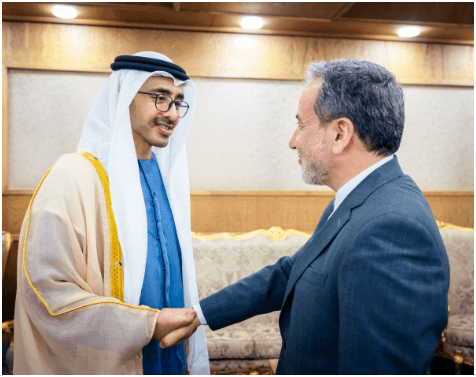Sheikh Abdullah Bin Zayed Al Nahyan, the Minister of Foreign Affairs and International Cooperation of the United Arab Emirates,
Held an influential meeting with Iran’s Parliament Speaker, Mohammad Bagher Ghalibaf. This high-level engagement marked a pivotal moment in the UAE’s ongoing efforts to foster stronger regional ties and promote stability in the Middle East.
The meeting, which took place in Tehran,Sheikh Abdullah Bin Zayed Engages was characterized by a spirit of openness and cooperation. Both leaders expressed a mutual desire to enhance bilateral relations and address regional challenges through dialogue and collaboration. This encounter comes at a time when geopolitical tensions in the region have underscored the need for constructive engagement and diplomatic initiatives.
Sheikh Abdullah Bin Zayed emphasized the UAE’s commitment to building bridges with neighboring countries, highlighting the importance of diplomatic channels in resolving conflicts and promoting peace. He noted that the UAE values its relationship with Iran and is keen to explore areas of mutual interest that can benefit both nations. This approach aligns with the UAE’s broader foreign policy strategy, which focuses on peaceful coexistence, economic cooperation, and regional stability.
During the discussions, several key topics were addressed. One of the primary issues on the agenda Sheikh Abdullah Bin Zayed Engages associated was the security situation in the Gulf region. Both leaders acknowledged the need for collaborative efforts to ensure maritime security and protect vital shipping routes. This is particularly important given the strategic significance of the Strait of Hormuz, a critical chokepoint for global oil supplies. Sheikh Abdullah and Speaker Ghalibaf agreed that ensuring the security of these waterways is paramount for the economic stability of the region and the broader international community.
Another crucial topic was economic cooperation. The UAE and Iran have historically had strong trade relations, and both leaders expressed a desire to further enhance economic ties. They discussed potential areas for cooperation, including investments, trade partnerships, and joint ventures in sectors such as energy, technology, and infrastructure. Strengthening economic links not only benefits the two countries but also contributes to regional prosperity and development.
In addition to security and economic issues, the meeting also touched upon cultural and people-to-people exchanges. Both leaders recognized the value of fostering cultural understanding and promoting exchanges in education, tourism, and the arts. Such initiatives can help bridge gaps and build a foundation of trust and mutual respect between the peoples of the UAE and Iran.
The issue of regional conflicts and crises was also a significant part of the dialogue. Sheikh Abdullah Bin Zayed and Speaker Ghalibaf discussed the ongoing conflicts in Yemen and Syria, emphasizing the need for peaceful resolutions and the importance of humanitarian assistance. The UAE’s foreign minister reiterated his country’s stance on supporting diplomatic solutions and providing aid to alleviate human suffering in conflict zones. This aligns with the UAE’s humanitarian efforts and its role as a key player in regional and global humanitarian initiatives.
Sheikh Abdullah’s visit to Tehran is seen as a strategic move to recalibrate the UAE’s approach to regional diplomacy. By engaging directly with Iran, the UAE demonstrates its willingness to take proactive steps in addressing regional issues and reducing tensions. This approach is reflective of a broader trend in the Gulf region, where countries are increasingly seeking dialogue and cooperation over confrontation.
The meeting also holds significance in the context of the broader international landscape. As global powers grapple with shifting alliances and complex geopolitical dynamics, regional actors like the UAE and Iran play a crucial role in shaping the future of the Middle East. By fostering dialogue and cooperation, they can contribute to a more stable and prosperous region, which in turn has positive implications for global peace and security.
In conclusion, the meeting between Sheikh Abdullah Bin Zayed and Iran’s Parliament Speaker, Mohammad Bagher Ghalibaf, represents a noteworthy step in the UAE’s diplomatic efforts. Through open dialogue and a focus on mutual interests, both leaders demonstrated a commitment to enhancing bilateral relations and addressing regional challenges. This engagement underscores the UAE’s dedication to peaceful coexistence and regional stability, setting a positive example for other nations in the Middle East. As the UAE continues to navigate the complexities of regional diplomacy, such high-level engagements are likely to play a pivotal role in shaping the future of the region.
Stay Connected: ”Your Source for the Latest News Updates“





